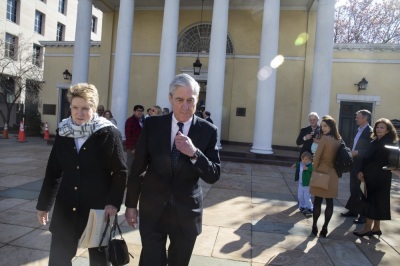Robert Mueller and the reality of partisan politics

Anyone watching Robert Mueller’s congressional testimony this week must have felt compassion for him. His delivery has been described as “halting.” It was, at times, but at others it was outright stilted, as though the man were grasping not just for the right word but for the ability to structure a sentence.
Mueller’s behavior made me sad. A combat-wounded veteran and Bronze Star winner during the Vietnam War, Mueller led the FBI for 12 years with integrity and ability. Yet for a once-rigorous with an in-charge personality, his conduct was very troubling. Does his rather disoriented, uncertain performance show mental deterioration? If so, was he “played” for the past two years?
I can’t answer the first question. His unfamiliarity with his own report and insistence he be accompanied by a senior aide do not inspire confidence in his knowledge of the issues at stake or that he closely monitored what his staff was up to over the past two years.
Someone with a personal knowledge of Mueller shares concerns about his one-time boss’s well-being. Glenn Kirschner, a former federal prosecutor who worked with Mueller, said yesterday, “Bob Mueller is struggling. It strikes me as a health issue. We need only look at footage of his earlier congressional appearances to see the dramatic difference in his demeanor and communicative abilities.” https://twitter.com/glennkirschner
As to Mueller being “played,” taken advantage of by virtue of his over-generous trust in his subordinates, we know that at least 13 of those on Mueller’s investigative staff are Democrats (possibly more). When confronted about this during his House Judiciary Committee hearing, Mueller responded, “In 25 years in this business, I have not had occasion once to ask somebody about their political affiliation. It is not done. What I care about is the capability of the individual to do the job and do the job quickly and seriously and with integrity.”
Let’s assume Mueller means it. He believes he should not ask a federal employee who is sworn to uphold the Constitution about his or her partisan affiliation.
This might sound noble, but is so willfully naïve as to invite disbelief if not actual shock. Deeply-held personal convictions are not parked with one’s car before he enters his office. Even if the men and women on Mueller’s investigative staff strove to be fair, having a staff composed of obvious partisans does not encourage confidence in the accuracy of their findings.
In the politically charged, even volatile, environment of this complex and profoundly important investigation, does Mueller’s childlike faith in the objectivity of all federal lawyers justify his hiring decision? I’m reminded of a statement by then-Secretary of State Henry Stimson regarding American counterintelligence: “Gentlemen do not read each other’s mail.”
Stimson actually assumed America’s enemies were “gentlemen.” Mueller actually believes that ideas have no consequences. And I’m about to go hopping with the Easter Bunny.
One need not ask a potential hire about his or her political affiliation, but partisan commitments are not hard to find out. I’m sure Mr. Mueller has heard of such things as the public record and the internet.
It is my hope that there was no collusion between Donald Trump, his election team and the Russian government. I suspect there was not, at least anything of an organized nature. The conduct of the Clinton campaign is at least, if not more, suspicious.
But as to the politics of the Mueller investigation, here are two takeaways:
First, desperation can lead to bad judgment. The Democratic majority in the House is composed of men and women eager to end the Trump presidency. They virtually salivated over the prospect of prodding Robert Mueller into saying things during his hearings that could provide the basis for impeachment.
They failed. “Democrats on the Judiciary and Intelligence committees should be flailing in range of their chairmen, Jerrold Nadler and Adam Schiff, who wanted these hearings just for the sound bites they might provide,” writes John Kass in the Chicago Tribune. And not just Democrats on those committees. I suspect that Nancy Pelosi is about to explode at her hardest-left caucus members, “Enough!”
Second, there is no such thing as smooth, complete dispassion. Politics is about more than roads and bridges, agriculture subsidies and funding the arts. It’s about things that go to the heart of what liberty, justice, security, and representative self-governance mean and how they intersect.
Given this, it’s imperative that in the future, whoever leads high-level “independent” investigations be savvy enough to find out what his or her staff believes about such things. Balance it out. Iron sharpens iron, as Proverbs says. Constructive conflict can produce a finer result.
As to Robert Mueller, let all Americans wish this devoted public servant well. And now, let’s all move on.




















